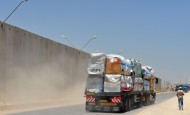Questions for World Vision
On August 4, 2016, the Shin Bet (Israel Security Agency) announced that Mohammed El-Halabi, the manager of operations in Gaza of the international humanitarian NGO World Vision, funneled 60% of World Vision’s Gaza budget to the terrorist group Hamas.
This announcement highlights the inherent danger of humanitarian groups operating in warzones, risking the diversion of aid by violent actors, including terrorist organizations. Since the arrest, World Vision has released limited information regarding El-Halabi, the organization’s finances, and allegations of anti-Israel biases in World Vision staff.
A number of important questions still remain for World Vision to answer. The issues of concern can be categorized into two areas: political/ideological agendas, and financial managements and due diligence, although the former can lead to failures in the latter.
- Political/ideological agendas:
- As NGO Monitor and others have documented, World Vision officials have a record of bias which repeats the Palestinian narrative, as well as hostility towards Israel and Jewish sovereign equality, including what appears to be unwitting condescension. Some recent statements made by World Vision officials, as noted by Rabbi James Kennard in his response to Rev. Costello in the Australian Jewish News were highly problematic. We strongly urge World Vision officials to address and understand the sensitivity of these themes, particularly in Rev Costello’s scheduled keynote speech before the Hadassah organization in Australia.
- A number of WV-IL (the Israeli entity of World Vision, registered with the Registrar of Non-Profits) officials are involved in other organizations that promote demonization campaigns: 1) Sami Khoury, listed as the financial manager in the 2015 report, is a member of Sabeel’s General Assembly. Sabeel is a leader of church demonization, including the use of overtly antisemitic themes; 2) Raffoul Rofa, a board member since 2008 and chair since 2009, is also the director of the Society of St.Yves, a highly politicized anti-Israel NGO; 3) Founder Michel Sabbah authored (with Naim Ateek of Sabeel and Atallah Hanna) the 2009 Kairos Palestine document, which promotes BDS in churches, compares Israel with the South African apartheid regime, and denies the Jewish historical connection to Israel; 4) Anton Asfar is a member of the WV-IL board of directors, and serves on the board of St. Yves.
- In his response, Rabbi Kennard also noted that a high-level World Vision official, Steven Haas, attacked Christian Zionism with echoes “of the odious anti-Jewish ‘Replacement Theology’)” and that World Vision properly and publicly distanced itself from his position. However, Mr. Haas remains a vice-president of the organization.
- According to Sabeel’s 2013 Report to the Israeli Non-Profit Registrar (on file with NGO Monitor), World Vision provided an undisclosed amount to Sabeel. In correspondence with NGO Monitor (Evelyn of Donor Contact Services at World Vision U.S.), World Vision stated that it “does not fund or partner with the Sabeel Ecumenical Liberation Theology Center.” Is there any additional information to explain the origins of the Sabeel claim?
- Financial management:
- WV-IL’s financial report (the Israeli amuta) lists approximately $1.5 million in 2014 for salaries and associated expenditures. (Project costs are listed as $14.7 million in 2014.) How many of the “150 staff across Jerusalem, West Bank and Gaza”, of which 120 apparently work in Gaza, are paid from this budget? What framework is used to pay the salaries of the other employees, and what is the budget?
- In recent statements, World Vision officials have claimed that the cumulative Gaza budget was $22.5 million over the past 10 years. How much of this was for salaries and how much for projects?
- World Vision JWG lists total expenses over $100 million during that time period, and WV-IL financial reports, while somewhat incomplete, indicate a larger amount. Approximately what percentage of this amount was used for Gaza operations, how much for Jerusalem-West Bank, and how much for costs covering both?
- In lengthy correspondence between the Israeli Registrar and WV-IL (copies on file with NGO Monitor), the Registrar stated that WV-IL repeatedly failed to submit the necessary documents for compliance with reporting requirements, including failure to provide “details on the transfer of funds to projects, including the purpose of the transfers.” Has the information now been provided, and if so, is World Vision prepared to make it public?
- The registrar also requested information regarding “local donations”, listed as $790,000 in 2014. According to the WV-IL report, none of these donations exceeded NIS 20,000 (~$5,000). The Registrar requested documentation, and WV-IL’s attorney replied (March 10, 2015) that “the amuta is not dependent on any Israeli [financial] sources.” Has the information now been provided, and if so, is World Vision prepared to make it public? What information is WV willing to provide on the source of this “local funding”?
- Regarding World Vision’s previous investigations of Mr. el Halabi prior to his arrest, as referenced in news reports: “(World Vision had already investigated Halabi in 2015, after one of its accountants, who had recently been fired, accused him of stealing money and working with Hamas. The charity brought in an outside investigator to review its books; the audit turned up nothing suspicious.”)
Which World Vision framework led the investigation, and to which bodies or departments did the investigator report? Did investigators contact Israeli authorities concerning these allegations, or request assistance in the investigation?


